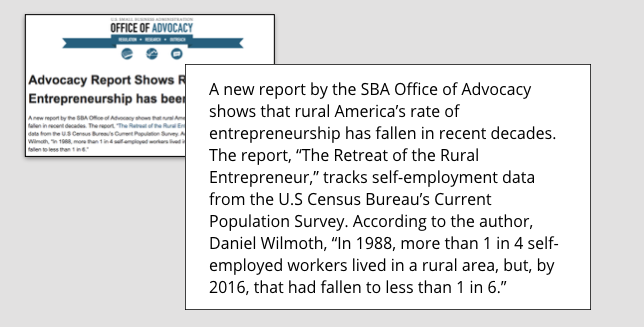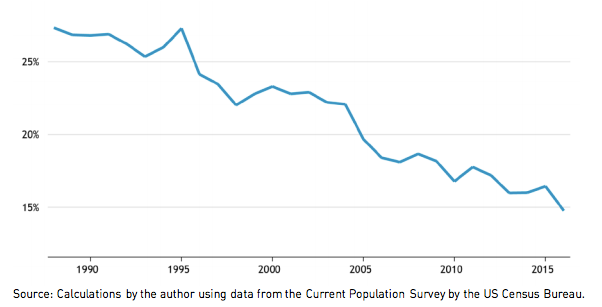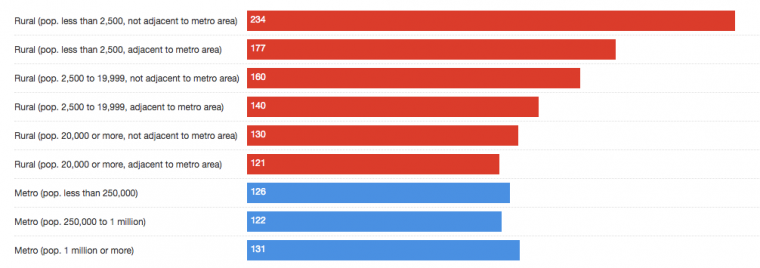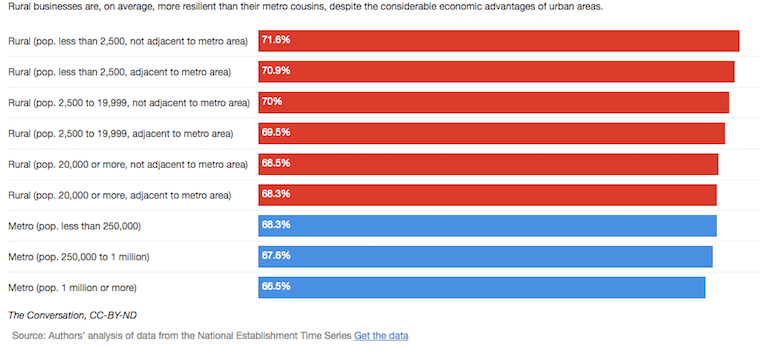(Update: See the bottom of the post.) A report released on Wednesday (Oct. 4, 2017), by the Small Business Administration Office of Advocacy, claims that “the rural entrepreneur is in retreat.” However, the metrics and methods used in preparing the report only tell a small part of the rural entrepreneurship story. While challenges facing those who start and operate rural small businesses–or continue a legacy of running a family farm or business–are daunting (as we often report), the report and its title ignore too much information to claim that it’s time to sound the retreat for rural entrepreneurship.
Is the rural entrepreneur retreating?

Typically, when an analyst makes a major claim like, “rural entrepreneurship is retreating,” the analyst uses a set of metrics on which to base their claim. In this case, the report’s author uses only one metric: The percentage of U.S. self-employed people who live in rural areas of the U.S., based on a tracking survey conducted by the U.S. Census Bureau. The author then labels that one metric, “rural entrepreneurship.” Then, the analyst claims that “rural entrepreneurship” as measured by trends in the “percentage of all self-employed Americans,” has fallen from 25% in 1988 to 17% in 2016.
25% | 1988 percentage of total self-employed workers who lived in rural areas of U.S.
17% | 2016 percentage of total self-employed workers who lived in rural areas of U.S.
The author makes it look even more alarming by including as its first exhibit, this trend-line showing a year-by-year view of the same metric, the percentage of all U.S. self-employed living in rural areas.

No, rural entrepreneurship is not retreating.
Typically, the terms “entrepreneurship” or “entrepreneur” refer to starting and growing companies while “self-employed” is a term used by the IRS to describe individuals who must pay federal taxes themselves (rather than through withholdings) because their compensation for work does not come to them in the form of a salary or wage. To use “self-employed” as one proxy term for entrepreneurship is fine, even appropriate. But having it as the only metric ignores one of the most important facets of the concept of entrepreneurship: the creation and growth of businesses.
Earlier this year, using a broader array of metrics, including business starts and closings, a major report from Colorado State University concluded that:
“Rural areas are surprisingly entrepreneurial.”
“Most people mistakenly believe pioneering establishments occur overwhelmingly in metropolitan areas, such as in the now-mythic start-up culture of Silicon Valley,” observed one of the report’s authors, Stephan Weiler, professor of economics at Colorado State. “Yet according to the U.S. Census Bureau, it is, in fact, non-metropolitan counties that have higher rates of self-employed business proprietors than their metropolitan counterparts.,” wrote Weiler.
According to Weiler, “entrepreneurship should be measured by ‘proprietorship,’ a tax status indicative of at least one self-employed individual, who may also employ others. One proprietor may own multiple businesses.” Applying that definition of entrepreneurship on a pro-rata basis that measures entrepreneurship per 1,000 residents of an area, Weiler showed that rural areas are the most entrepreneurial.
Entrepreneurship per 1,000 residents

Rural businesses survive longer than non-rural businesses
Another factor in displaying the entrepreneurship of rural areas is their survival rate compared to non-rural businesses. According to Weiler, relatively isolated non-metropolitan businesses are on average more resilient than their metro cousins, despite the considerable economic advantages of urban areas, which boast a denser network of workers, suppliers, and markets. “The resilience of rural start-ups is perhaps due to more cautious business practices in areas with few alternative employment options,” observed Weiler.
Five-year business survival rates

Rural entrepreneurship retreating? Are you kidding?
Google the term “Agtech” (for agriculture technology) and you’ll find a long list of articles about the growth of VC firms heading to the heartland. “Agtech startups raised more than $320 million (by May, 2017) more than three-fold increase over the same period last year,” reported TechCrunch in a typical article. (A topic we will explore in a later post.)
Or better yet, visit the front-line “never-retreat” website, Small Business Survival, started a decade ago by our friend and frequent SmallBusiness .com contributor, Becky McCray.
Bottomline
If you want to make an argument that small businesses in rural areas are “retreating,” you can find statistics to back up your claim. But it’s not insightful to ignore that a century-old trend is the actual cause, not some sudden factor related to small business owners “retreating.”
As the accompanying graphic from the U.S. Census illustrates, the number of rural Americans has remained remarkably steady for the past century. However, the population of urban and suburban areas has sky-rocked during the same period. (While the Office of Advocacy report does include this metric, it fails to do so in a way that conveys that such a statistic has no bearing on the entrepreneurship of rural small businesses. )
In other words, the fact that urban centers have grown dramatically during the past century has no bearing on whether or not the people who live in rural areas are entrepreneurial, or not. If it could, the same “fact” could be applied to any type of cohort you’d want to show are retreating: rural Sunday School teachers, rural astronauts, rural bloggers, etc.
Understanding the challenge of being a rural small business is hard enough. There’s no reason to make it sound more challenging than it is, or much worst, to imply that rural business owners are in retreat when it comes to entrepreneurship.
Update: Shortly after posting this article, an announcement from Microsoft reminded us once more not to write off rural entrepreneurship. The company announced it is teaming up with six communities in North Dakota, Wisconsin, Virginia, Texas, Wyoming and Washington state in a program broadly aimed at fostering economic growth in rural and smaller metropolitan areas. The program is a multi-year, multi-million dollar investment meant to help teach computer science to students, expand rural broadband and create and fill jobs. Sounds like another good reason not to write off rural entrepreneurship.
Cover image: Monroe County, Pennsylvania via istock

